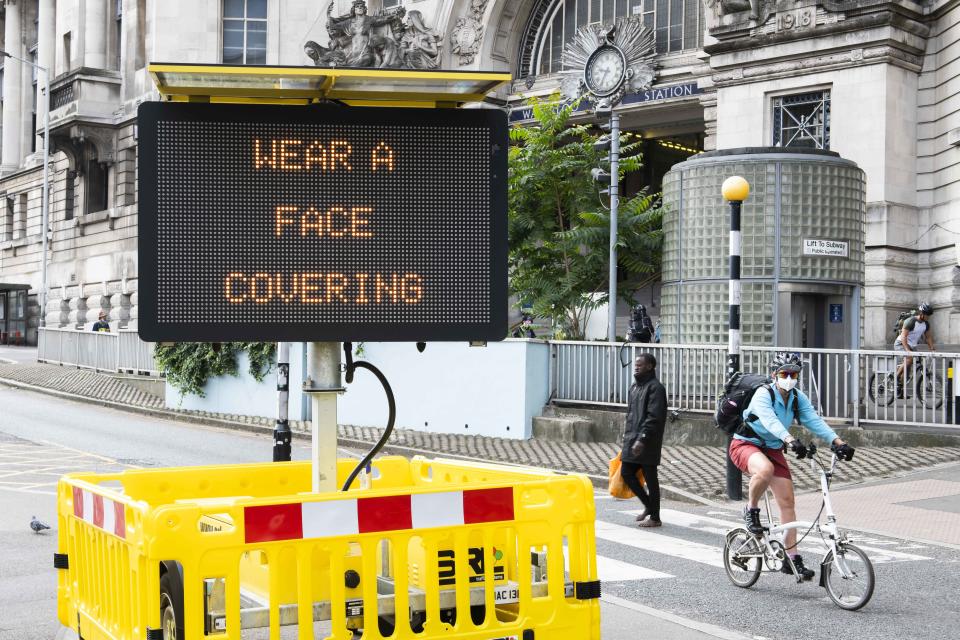Coronavirus outbreak ‘far worse in UK because government didn’t impose border restrictions sooner’

Coronavirus was able to spread faster through the UK because the government failed to shut the country’s borders in the early stages of the pandemic, MPs have said.
A Commons Home Affairs Committee report highlighted “critical errors” in the government’s strategy including the decision to lift all border restrictions in March.
The government faced criticism for allowing people from Spain to come to the UK for a Champions League match between Liverpool and Athletico Madrid at a time when cases were higher in Spain.
Chancellor Rishi Sunak defended the government for not banning international travel for the sporting event, saying: “At every stage in this crisis we’ve been guided by the scientific advice and have been making the right decision at the right time.

“This is an unprecedented situation we’re all dealing with, I’m sure there are all things that we will learn from this.”
The Home Affairs Committee report, however, said the lack of restrictions on people entering the UK had “accelerated” the scale and pace of the pandemic and led to “many more people contracting COVID-19”.
Committee chair Yvette Cooper said: “The government’s failure to have proper quarantine measures in place in March as the infection was spreading fast was a grave error and meant COVID spread faster and reached more people.

“The UK was almost unique in having no border checks or quarantine arrangements at that time. That alone should have rung loud alarm bells for ministers and made them think again.
“Many times ministers told us they were following the science, but we cannot find any science at all behind their completely inexplicable decision to lift all the self-isolation guidance for travellers on 13 March, a full 10 days before lockdown, just at a time when other countries were introducing stronger border measures.
“We were told that thousands more people with COVID-19 came back to the UK after that guidance was lifted.
“So in the middle of March, at a time when the number of people with COVID coming back into the UK was at its peak, they were going back to work or on to public transport or seeing family without any quarantine in place.”
The group of MPs behind the Home Affairs Committee report said they supported the decision to quarantine travellers returning from Spain.
But they said there needed to be improvements in how the government decided which countries are eligible for so-called “travel corridors”.
The report looked at all of the government’s decisions on border measures during the crisis so far, including the return of British nationals from Wuhan.
It also examined the introduction of mandatory quarantine in June and the recent introduction of travel corridors for several nations popular with holidaymakers from the UK.
The authors concluded that “thousands of people with COVID-19 arrived in or returned to the UK in February and March”.
They said: “The UK’s experience of COVID-19 has been far worse as a result of the government’s decision not to require quarantine during March, which would have reduced the number of imported infections.”
It follows a report from the COVID-19 Genomics UK consortium (Cog-UK) that found coronavirus was brought into the UK on at least 1,300 separate occasions.
Researchers analysed the genetic code of more than 20,000 UK patients infected with the virus and found that less than 0.1% of those imported cases came directly from China.
They claim the UK's coronavirus epidemic was largely initiated by travel from Italy in late February, from Spain in early to mid-March and from France in mid- to late March.
The report estimates that 80% of the initial cases arrived in the UK between 28 February and 29 March – during most of which the government was debating whether to enter lockdown.
The government’s own scientific advisory committee Sage has previously said more than 20,000 lives could have been saved if lockdown restrictions had been introduced earlier.
Prof Neil Ferguson, who leads the outbreak modelling group at Imperial College London, said: “Had we introduced lockdown a week earlier we’d have reduced the final death toll by at least half.
“The measures, given what we knew about the virus then, were warranted. Certainly had we introduced them earlier we’d have seen many fewer deaths.”
Coronavirus: what happened today
Click here to sign up to the latest news and information with our daily Catch-up newsletter

 Yahoo News
Yahoo News 

